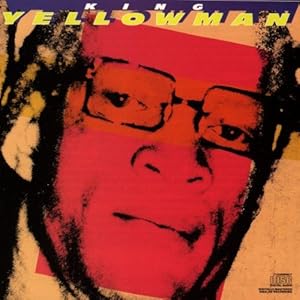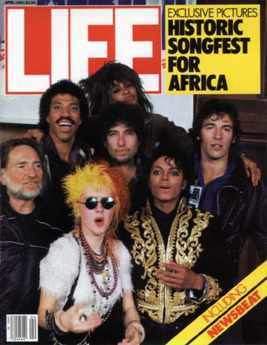More on the aid to Africa issue. I can't help myself. I hear about it everywhere so now it's deep in the membrane. But in contrast to my last note on the matter, this is where I've gathered a few of my more whimsical thoughts. Speaking of the last entry, though. I forgot to mention Professor Sir Nicholas Stern's comments, which I think are very incisive regarding Africa's internal economic barriers, some of the causes, and the unfortunate effects.
The title is a pidgin expression meaning "just who do they think they are?" ("dash" means to give) That was the general response among folks I knew at school in Okigwe, Nigeria to Band Aid's "Do they know it's Christmas?"
And there won't be snow in Africa this Christmastime
The greatest gift they'll get this year is life(Oooh)
Where nothing ever grows
No rain or rivers flow
Do they know it's Christmastime at all?
Essaywhaman? Do whaaa? You what huh? Na wetin? Na who dash monkey banana? Ewu bekee think say nothing dey grow for Africa?. We figured it was worth inviting Geldof and clique to the Okigwe rain forest, where it was so fertile that you were lucky if an oil palm tree didn't shoot up under your feet and knock you off balance; where before the school administration in their infinite stupidity had chopped down almost all the foliage within the school compound boundaries, any hungry kid could climb the nearest mango, udala, icheokwu, orange or cashew (for the sweet, fleshly fruit, not the nut) tree and eat as much as they wanted. We figured it would be a worthwhile education for the Band-Aid brigade.
 And sure we felt sorry for the folks suffering a local drought in Ethiopia, but our most immediate response was to feel sorry for the confused Brits. We were making our own "Do they know it's summertime" outreach long before the current version, inspired in part by Yellowman's "London cold" song ("Jamaica Nice/Take me home"). Ka anyi bute oku na obodo oyibo ("Igbo: let's take some warmth to the West").
And sure we felt sorry for the folks suffering a local drought in Ethiopia, but our most immediate response was to feel sorry for the confused Brits. We were making our own "Do they know it's summertime" outreach long before the current version, inspired in part by Yellowman's "London cold" song ("Jamaica Nice/Take me home"). Ka anyi bute oku na obodo oyibo ("Igbo: let's take some warmth to the West").
And there won’t be any sun in England this Summertime
The biggest problems they’ll have this year are rife (Oooh) Where the sun never glows
The wind or is it snow
Do they know it’s Summertime at all
—Chukwu-Emeka Chikezie of AFFORD
 Heeee heee! And then Michael Jackson did his thing. Okay, so no daft lyrics about snow-deprived Decembers on the continent, and the song was actually pretty good this time (the Quincy Jones magic, I guess). Some of the press statements at the time were a hoot, though. The galling point remains that pop stars see nothing wrong with the idea of patronizing an entire continent. Who dash monkey banana?
Heeee heee! And then Michael Jackson did his thing. Okay, so no daft lyrics about snow-deprived Decembers on the continent, and the song was actually pretty good this time (the Quincy Jones magic, I guess). Some of the press statements at the time were a hoot, though. The galling point remains that pop stars see nothing wrong with the idea of patronizing an entire continent. Who dash monkey banana?
It's 2005. Here we go again. I don't even need to call it. Sokari does the job in "We're not whales"
My prediction that the presentation of African countries during Saturday's concerts would be a negative pitiful one was correct. We were presented with Africa as the “scar of the world”, passive, starving, diseased, dying and helpless. This was a conscious decision by the organisers of the concert to make the crowd sympathetic to their cause and at the same time make them feel good, make them feel as if they had made a contribution to saving Africa.
Not only does it infantilise Africans and Europeans, it also facilitates the continued appropriation of all things African and all things in Africa including our problems and reduces the issues to cheap sound bites and meaningless nauseating rhetoric that go down well in the kindergarten playground of liberal politics.
I don't agree with everything she says in that article, but it comes close enough to my views to save me a lot of typing. And Ethan Zuckerman does more than his fair share in "Africa’s a continent. Not a crisis." (via Emeka Okafor)
If the goal of Live 8 were to help people see the African continent as a place they want to visit, a place they want to open businesses in, a place they want to engage with, as opposed to a place they want to save, I’d be more likely to share Brian’s (of Black Star Journal) hopes.
But that would be a very different concert. It would be one that celebrated the cultural richness of the continent by putting African artists on stage, rather than inviting them - after Geldof was shamed by Peter Gabriel - to perform at a parallel event a hundred miles away from the main action. It would be one that put African leaders, entrepreneurs and innovators on stage, rather than using a silent young Ethiopian woman as a stage prop for Madonna and Geldof. It would be one that was more focused on changing the global image of Africa than on somehow changing the minds of the eight guys sitting around a table in Scotland..."
Another Ghanaian blogger with a different sort of quotable on the matter is Koranteng Ofosu-Amaah, probably familiar to Copia readers, who recently got to air his thoughts on the African aid buzz on the radio. To seize upon an aside:
I didn't mention the other statistic that underlies my point about Nigeria moving: the installation of 1 million cell phone lines in Nigeria in the past year. And anyone who has had to deal with the acumen of Nigerians in whatever sphere knows that if that society decides to advance, it will change in very short order. It will still be difficult, unwieldy and disorderly, but it will move and possibly even faster than India or China will.
Well, there's a bit of modesty going on here. Given that my own life was saved by a Ghanaian doctor in Nigeria after one British and one Nigerian doctor had given up treating me (long story), and given my other experiences with Ghanaian professionals, the nation of Black Stars has a whole heap of a lot to work with. And there is the object lesson about internal trade in the continent. The mutual respect of professionals will show the road to the achievements of China and India, if our leadership allows it.
But what about those leaders? They're off having to be lectured on dignity and the realities of aid by The Colonel. And check it out. The Nigerian government, singing that Johnny Kemp: "Just got paid, Friday night...", starts by tipping the back pocket at those world champion runner-up Flying Eagles. Maybe they should also buy a pair of glasses for the punk ass referee who gift-wrapped the championship game for Argentina. No, for real, maybe they should just pay Siasia, the over-achieving coach. I guess the expression "Who dash monkey banana" slices in multiple ways.
[Uche Ogbuji]
 And sure we felt sorry for the folks suffering a local drought in Ethiopia, but our most immediate response was to feel sorry for the confused Brits. We were making our own "Do they know it's summertime" outreach long before the
And sure we felt sorry for the folks suffering a local drought in Ethiopia, but our most immediate response was to feel sorry for the confused Brits. We were making our own "Do they know it's summertime" outreach long before the  Heeee heee! And then Michael Jackson
Heeee heee! And then Michael Jackson 